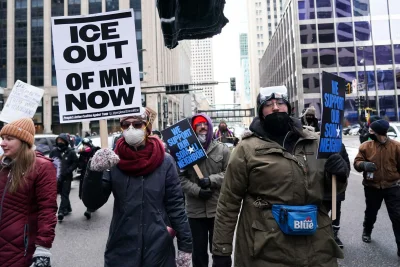Ecuador files protest after ICE tries to enter its consulate in Minneapolis

Jan. 28 (UPI) — The Foreign Ministry of Ecuador has filed a protest with the U.S. Embassy in the South American country after a federal immigration agent tried to enter its consulate in Minneapolis.
Uncorroborated video of the incident shared online shows a consular employee confronting Immigration and Customs Enforcement agents attempting to enter the facility.
The employee stands in the doorway and tells the ICE agent that he is not allowed to enter. The ICE agent is heard telling the employee to “relax” and threatens to “grab” the employee if the agent is touched.
The employee repeatedly tells the ICE agent he is not allowed to enter the premises. The agent then leaves. The incident lasts less than a minute.
“Officials of the Consulate prevented the ICE officer from entering the consular premises, thereby ensuring the protection of Ecuadorians who were present at the consulate at the time, and activating the emergency protocols issued by the Ministry of Foreign Affairs and Human Mobility,” the Foreign Ministry of Ecuador said in a statement.
The incident occurred at about 11 a.m. CST Tuesday, the ministry said.
UPI has contacted ICE for comment.
Law enforcement of the host country is generally prohibited from entering diplomatic missions of foreign nations, including consulates, except with the consent of the head of the mission, Article 22 of the Vienna Convention on Diplomatic Relations of 1961 states.
Minneapolis City Council Member Elliot Payne, of the Minnesota Democratic-Farmer-Labor Party, said he spoke with Ambassador Helena Del Carmen Yanez Loza who explained they were filing the protest “so that they know that their community is safe coming here.”
“It’s really important that our Ecuadorian community knows that their consulate is a safe place to come and do the business that they need to do,” Payne said in a video statement published on Instagram.
The council member added that community members in the area monitoring the situation have been “really helpful” to ensure people feel safe coming to the consulate, encouraging them to continue with their service.
“Stay out on these foot patrols. Stay out on Central Avenue. Stay safe. Stay vigilant,” he said.
Launched by the Trump administration in December, Operation Metro Surge has seen thousands of federal immigration officers deployed to Minneapolis with the mission to arrest and then deport undocumented migrants with criminal records.
Thousands of migrants have been arrested. Activists and civil and immigration rights advocates have accused federal agents of detaining U.S. citizens, racial profiling people and using excessive force as well as violating due process rights.
Residents have taken to the streets in protest against the Trump administration’s immigration crackdown and have been met with violence, resulting in the fatal shooting of two U.S. citizens by federal immigration officers in the city this month.